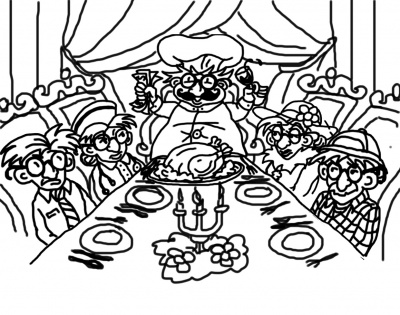Baker's Story
The Baker's Story is a story in Rocket Scientists' Guide to Money and the Economy[1] used to teach about the toxic dynamic of accumulation made possible by the abstraction of Labor into Money. The story follows the exploits (and exploitation) of Joe the Baker as he first learns unfair trading practices that enrich him at the expense of all others, and then learns to obfuscate, obscure, and enhance his unfair trading practices in order to enhance his own personal wealth and power.
Related LP Terms
Non-LP Related Terms
- → Labour | Work | Labour Time
- → Barter | Money (Labour Value of Money / Labour-Exchange Value of Money)
- → Accumulation | Power | Debt | Global Crises
- → Social Class | The Baker's Story
Notes
The Baker's story is an illustrative tale that explains the concept of accumulation and its consequences in a monetized economy. Here’s a summary of its meaning and message:
Summary of the Baker's Story
Initial Situation:
A small community operates on a fair exchange of labor, where everyone trades their work equitably. Joe, the baker, initially charges a fair price for his bread, reflecting the actual labor cost.
Shift to Accumulation:
Joe decides to charge more than the true labor cost for his bread, thus beginning to accumulate extra labor in the form of money. Over time, this accumulation results in Joe having significantly more labor units (money) than he actually worked for. Power Dynamics:
The extra money gives Joe power over others, as he can now command their labor to fulfill his desires (e.g., building a mansion). Joe's newfound wealth and power distinguish him from others in the community, leading to inequality. Community Reaction and Ethical Dilemma:
The community notices Joe’s wealth and starts asking questions about how he acquired it. Joe faces a choice: reveal the truth about overcharging (accumulation) or hide it to maintain his advantage. Joe rationalizes his actions, deciding not to disclose the real source of his wealth to avoid backlash and loss of accumulated labor.
Moral and Social Implications:
The story highlights how accumulation disrupts social harmony and fairness in an economy. Accumulation leads to inequality, as those who accumulate more labor (money) gain power and privileges over others. The story underscores the ethical issues and societal problems caused by prioritizing profit (accumulation) over fair labor exchange.
Message of the Baker's Story
The Baker's story conveys several key messages:
Accumulation Leads to Inequality:
The process of accumulating labor (money) beyond what is fair disrupts the balance in a community, leading to inequality and social stratification.
Ethical Concerns of Overcharging:
Charging more than the actual labor cost is unethical and creates an unfair advantage for those who do it, at the expense of others.
Power and Corruption: Accumulated wealth translates into power, which can corrupt individuals and distort their actions and decisions. Societal Impact:
The pursuit of accumulation can lead to social unrest and questions about fairness and justice within a community. Need for Transparency and Fairness:
The story emphasizes the importance of transparency and fairness in economic exchanges to maintain social harmony and ethical integrity.
In essence, the Baker's story is a cautionary tale about the dangers of accumulation, the ethical pitfalls of overcharging, and the broader social and moral implications of prioritizing profit over fair exchange.
Related LP Courses
Footnotes
- ↑ Mike Sosteric, Rocket Scientists’ Guide to Money and the Economy (St Albert, Alberta: Lightning Path, 2016), https://www.patreon.com/posts/lp-workbooks-and-91290808
